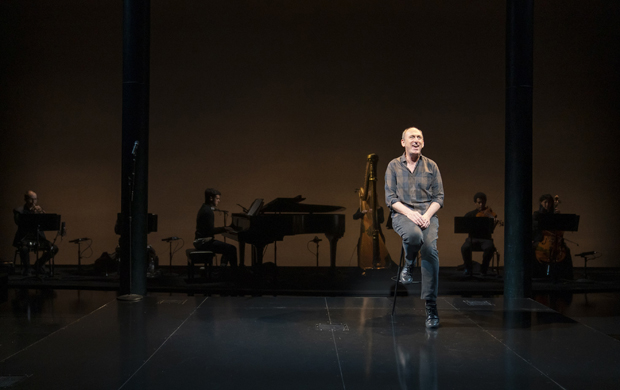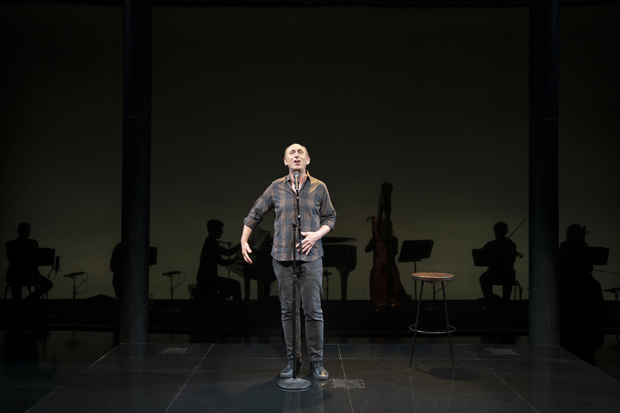Why David Cale Is Finally Ready to Tell the Life Story He's Been Fleeing
The acclaimed writer and performer delves into his deeply personal creative process for ”We’re Only Alive for a Short Amount of Time”.

(© Joan Marcus)
In David Cale's new autobiographical solo show, We're Only Alive for a Short Amount of Time, he portrays not only himself, but also his brother, father, and mother. The play follows Cale and his family, the Eggletons (Cale changed his name as an adult), as they play out their own sensationalistic but tragically true story. It's a narrative that Cale spent much of his life trying to flee, but now he's revisiting it in a very public manner.
"I was such a theatrical kid and always lived in such a fantasy world that it just had an unreality even though it was very, very real," says Cale. "My natural tendency to make things theatrical or cinematic was get just completely fed into it. Basically what I'm doing onstage is what I used to do in my bedroom. I just moved it, just like the bedroom show is now in the theater."
It took the writer and performer years to find the space to process his childhood experience and decades to be seized by the particular longing that became the impetus for reliving his story onstage.
Why did you decide to write a fully autobiographical show years after the events portrayed?
I don't think I could have done it a few years ago, artistically. I think it is a culmination thus far of everything I've learned, applied to this story. There were so many things I didn't want with this show. I didn't want it to be self-indulgent, or for people to feel sorry for me, because for years I didn't want to be defined by it. But when I started writing it, it became…I wanted to get my mother onstage. And that became the driving force. And I thought maybe it could be useful, too, because I think so many people have gone through some variation — maybe not as dramatic, maybe more dramatic — of this.
I do feel like I'm, on some level, on a little bit of a mission. Whenever it feels like it's my autobiography, I feel less interested in it. But if I'm right, like, just get Barbara on the stage. And just, it becomes, just do it right. I want it to be in the room, I want it to be with people. With all my shows, they have to be present, they have to be happening now with these people — not some kind of cookie-cutter, slick, polished, I go here, here, here, and I go home. That's not interesting to me; it has to be alive.

(© Joan Marcus)
That's such a good metaphor for the show. How did you feel after that first performance?
I thought I was doing something positive. And I also felt like the audience really responded to my mother. And I was like, all right, just get her on the stage, just try and find a home for her in the American theater. So that was really encouraging, to sense the connection in Chicago between when I was portraying my mother and the audience.
When you talk about the importance of putting your mother onstage, do you see that as important for the audience? Important for her or important for you?
It's important to me. I feel she was so abused. How she was treated in the tabloids is unbelievable. And it's just the way women were treated in that town, which still obviously is going on, all over. When we were doing the Chicago run, the Kavanaugh trial was running. And I was like, this woman is on trial and my mother was, it's like it's the same thing.
And then it became like, I want Barbara to be representative for some of the women in the audience. And that was the thing that was happening in Chicago that I felt in that first time we did it at New Stages. I felt there were moments when I could hear only women with her. And I thought: This is good.
And this is just my thing. But it's like, because I do think she was very artistic. I don't think there was ever any encouragement for it except in that first hat factory she worked in, which was run by a woman who really nurtured her. And then she threw it all in for Ron Eggleton. So part of me is like, you have to realize her gift. You've just got to be as talented as you can be. You've gotta pull on everything. And it's partly for her. It's connected to kind of representing her.
Like she says to you in the play…
"One day, you're gonna realize the potential in me that never saw the light of day." It's that thing. And I feel that with her.
I was struck by your ability to find her character from the perspective not of a child, but of a person who might have known her.
The tricky thing with my mother is that she was very mysterious too. The only areas where I had to use my imagination were with her. I went to a boarding school when I was 11 for three years, and my brother filled me in on some of the things. I didn't know that she painted, for example, till quite recently. She was elusive. Her whole life was that factory, and it was grim. She never went out. She didn't socialize. She was always on her own. You know, she would come home from work and maybe go in the garden, and then there was no "I'm going out tonight with x, y, and z," there was none of that. I don't remember her ever once going out with friends. And my father was never around. It's like trying to draw a painting or paint somebody that isn't there; it just keeps slipping away. But I can feel her. And the show's written out loud. So it's almost like trying to channel her and just write down what she sees.
At its best, I feel like I'm taken over by her. There are performances where it's, "Well, she's running this." So that was, for me, the most important part of the show, actually, that it's like she's in the room in some way.








